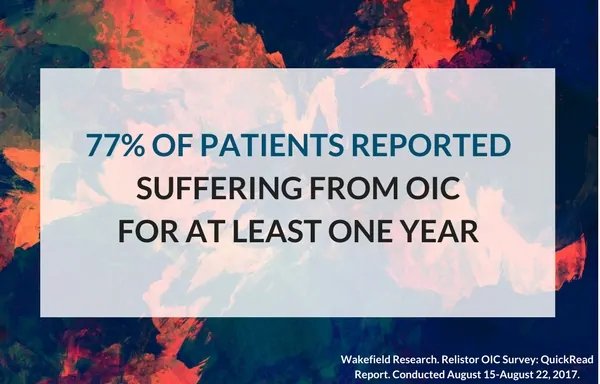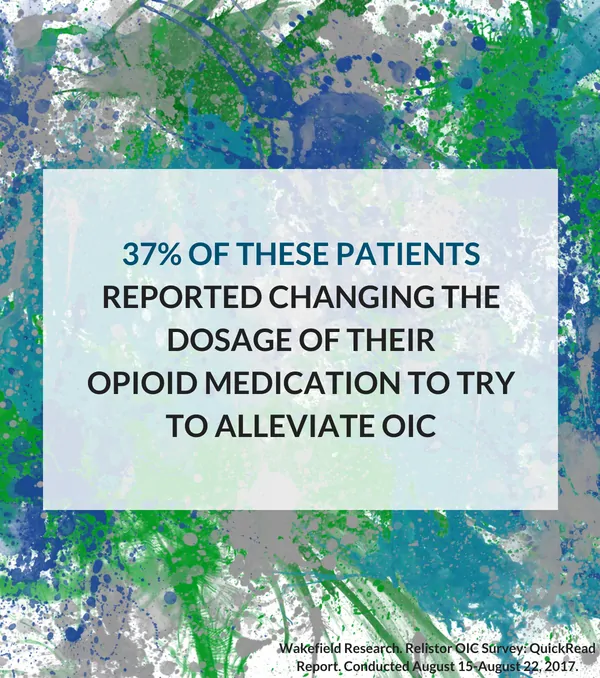Salix Pharmaceuticals provided me with a stipend and paid for my travel and accommodations related to the event.
However, all opinions are my own.
The contents of this blog are not medical advice and should not be deemed as such.
Finding an opioid induced constipation treatment that provides adequate and quick relief of symptoms may be important for patients and their providers. However, a recent online survey of 441 U.S. adults aged 18 years or older who were living with chronic pain, on opioid therapy and suffering from opioid induced constipation (OIC) revealed some interesting findings. The survey, conducted by Wakefield Research, sponsored by a partnership of the US Pain Foundation and Salix Pharmaceuticals, found that 77% of these patients reported suffering from OIC for at least a year. Why aren’t they getting relief faster?

Painstipation Defined
Salix Pharmaceuticals developed the term ‘Painstipation,’ also known as OIC, the constipation caused by opioids used for chronic pain. Dr. Joseph Pergolizzi likes to use it.
“Patients may not mention opioid induced constipation with their practitioner, so we need to have a ‘do ask, do tell’ policy. It’s important to realize that it starts with conversation. I like to use the phrase ‘Painstipation.’ These are chronic pain patients who are experiencing constipation due to their opioids.”
– Dr. Joseph Pergolizzi, Senior Partner & Director of Research, Naples Anesthesia and Pain Associates
What is OIC?
OIC is constipation caused by or worsened by the use of opioids, a prescription medication often used to treat chronic pain. Constipation is an irregularity in bowel activity that may be identified by one or more of the following symptoms:
- Hard stools
- Infrequent stools
- Need for excessive straining
- A sense of incomplete bowel evacuation
- Excessive time spent on the toilet
- Unsuccessful defecation
Constipation is often classified into two categories:
- Primary Constipation is caused by “intrinsic defects of colonic or anorectal function” and is typically diagnosed only after secondary causes are ruled out.
- Secondary Constipation is caused by “pathologic changes such as disease or intestinal obstruction” or by “medications (iatrogenic) such as opioids.”
Opioid-induced constipation is a type of secondary constipation and is one of the most common side effects of opioid use. Between 40 and 80% of patients taking opioids for chronic pain may suffer from OIC.
How Do Some Patients Deal with the Pain and Discomfort of OIC?
Many patients with chronic pain rely on opioids to complete their normal activities of daily living, but these opioids can often cause OIC, which in turn can cause pain and discomfort. Rather than stopping their opioid therapy to help relieve their OIC, they may reduce the dosage of their opioid medication, or alternatively increase the dosage to try to help with the pain caused by their OIC. 37% of the patients surveyed reported that they changed the dosage of their opioid medication in an attempt to alleviate the pain or discomfort caused by their OIC.

Using Art to Bring the Survey to Life
Recently, I was invited by Salix Pharmaceuticals to learn more about OIC. I joined a group of patient advocate bloggers including Chronic Babe, RheumaBlog, and Being Charis in Anaheim, California to learn about OIC and bring the survey statistics to life creatively through abstract art.
We had an opportunity to learn more about OIC, including the negative impacts it has on many patients’ lives, as well as the results of the survey mentioned above. We also shared how we started our blogging journeys, and although I personally don’t have a chronic illness, one significant theme was common in all our stories: We didn’t want to feel isolated anymore. We were given a robust art lesson from Smithsonian-archived artist Michael L. Jacques. We were then asked to express one of the findings of the survey and of our choosing on canvas.
Though abstract art is not my forte, we had a fantastic instructor who helped us understand how abstract art differed from other forms of art. One thing I found most difficult to get comfortable with was the need for contrast. The irony of my severe discomfort with contrast on a canvas was not lost on me. Adding the black sharp lines to my blue ocean canvas was painful (figuratively). The resulting image was my artistic attempt of the fact that 77% of patients in the survey said they suffered from OIC for at least a year.
Opioid Induced Constipation Treatment
As with any medical condition, the best course of action is to consult your doctor. This is especially important to remember with OIC. It’s also important for healthcare providers and professionals to candidly ask their chronic pain patients on opioids about their bowel movements. The more specific and targeted these healthcare providers can be with their patients, the better. Providers have to help patients understand that there are interventions that won’t require the cessation of opioid therapy.
Common treatments for constipation include:
- Increasing fiber intake
- Exercise
- Acting on urges to have a bowel movement
- Training pelvic muscles
- Laxatives or other medications
- Surgery
In some chronic pain patients being treated with opioids, RELISTOR® (methylnaltrexone bromide) may be a good option to relieve OIC. Relistor is an opioid antagonist that works to alleviate OIC and is designed to avoid impacting the analgesic effects of the opioids. Relistor has limited potential to cause pharmacokinetic drug-to-drug interactions. This is important to consider because 47% of OIC patients in the survey discussed in this blog post reported taking 6-10 prescription medications on a regular basis and 20% reported taking more than 10 prescription medications on a regular basis.

As healthcare professionals, we must be diligent in helping patients recognize and treat ‘Painstipation’, otherwise known as OIC, which can so often accompany opioid therapy in patients being treated for chronic pain.
INDICATIONS
- RELISTOR® (methylnaltrexone bromide) is a prescription medicine used to treat constipation in adults that is caused by prescription pain medicines called opioids.
- RELISTOR tablets and RELISTOR injection are used to treat constipation caused by opioids in adults with long-lasting (chronic) pain that is not caused by active cancer.
- RELISTOR injection is also used to treat constipation caused by opioids in adults with advanced illness or pain caused by active cancer and who need increases in their opioid dose for pain management.
IMPORTANT SAFETY INFORMATION
- Do not take RELISTOR if you have a bowel blockage (called an intestinal obstruction) or have a history of bowel blockage.
- RELISTOR can cause serious side effects such as a tear in your stomach or intestinal wall (perforation). Stomach pain that is severe can be a sign of a serious medical condition. If you get stomach pain that is severe, does not go away, or gets worse, stop taking RELISTOR and get emergency medical help right away.
- Stop using RELISTOR and call your healthcare provider if you get diarrhea that is severe or that does not go away during treatment with RELISTOR.
- You may have symptoms of opioid withdrawal during treatment with RELISTOR including sweating, chills, diarrhea, stomach pain, anxiety, and yawning. Tell your healthcare provider if you have any of these symptoms.
- Tell your healthcare provider if you have kidney or liver problems.
- Tell your healthcare provider if you have any stomach or bowel (intestines) problems, including stomach ulcer, Crohn’s disease, diverticulitis, cancer of the stomach or bowel, or Ogilvie’s syndrome.
- Tell your healthcare provider if you are pregnant or plan to become pregnant. Taking RELISTOR during pregnancy may cause opioid withdrawal symptoms in your unborn baby. Tell your healthcare provider right away if you become pregnant during treatment with RELISTOR.
- Taking RELISTOR while you are breastfeeding may cause opioid withdrawal in your baby. You should not breastfeed during treatment with RELISTOR. You and your healthcare provider should decide if you will take RELISTOR or breastfeed. You should not do both.
- Also, tell your healthcare provider about all of the medicines you take, including prescription and over the-counter medicines, vitamins, and herbal supplements.
- In a clinical study, the most common side effects of RELISTOR tablets in people with long-lasting (chronic) pain that is not caused by cancer include: stomach-area (abdomen) pain, diarrhea, headache, swelling or a feeling of fullness or pressure in your abdomen, sweating, anxiety, muscle spasms, runny nose, and chills.
- In a clinical study, the most common side effects of RELISTOR injection in people with long-lasting (chronic) pain that is not caused by cancer include: stomach-area (abdomen) pain, nausea, diarrhea, sweating, hot flush, tremor, and chills.
- In clinical studies, the most common side effects of RELISTOR injection in people receiving treatment for their advanced illness include: stomach-area (abdomen) pain, gas, nausea, dizziness, and diarrhea.
You are encouraged to report side effects of prescription drugs to FDA. Visit www.fda.gov/medwatch, or call 1-800-FDA-1088.
For product information, adverse event reports, and product complaint reports, please contact:
Salix Product Information Call Center
Phone: 1-800-321-4576
Fax: 1-510-595-8183
Email: [email protected]
Please click here for full Prescribing Information for RELISTOR tablets and RELISTOR injection.
Download Nurse Bingo Today!

Liven up any shift with a fun game of bingo. See who can fill a row first!
Fill a whole card and lose grip with reality.
Your privacy is protected. We will never spam you.









